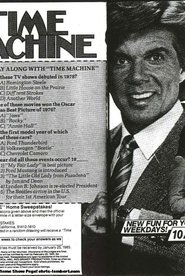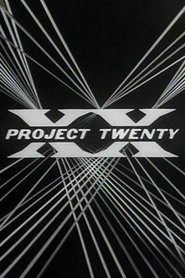Nbc TV Series - Page 73
-
Judge for Yourself
1953
Judge for Yourself
1953
Judge for Yourself, at first subtitled The Fred Allen Show, is a Mark Goodson and Bill Todman nontraditional court show/quiz show, with comedian Fred Allen as the emcee. It aired on NBC from August 18, 1953 to May 11, 1954. Dennis James was the series announcer but took over as host in January 1954. Each week three performers – singers, dancers, musicians, or comedians – were judged by two panels, one of professional entertainers and the other from the studio audience. If one of the amateur judges rated the acts 1, 2, or 3 in the same order as the celebrities, that individual would win a $1,000 prize. Two instrumental jazz groups that appeared on Judge for Yourself had considerable success thereafter, vibraphonist Terry Gibbs and the Marian McPartland Trio. The original intent of the series was to allow Allen to interact with guests, much as Groucho Marx did on his own NBC series, You Bet Your Life. The complicated format first employed, however, was revamped in the middle of the season. On the episod -
Hawkins Falls, Population 6200
1950
star 5Hawkins Falls, Population 6200 is the first successful American television soap opera. Sponsored by Unilever's blue detergent, Surf, the program began as a one hour comedy-drama on June 17, 1950, and ran in prime time on the NBC network until October 12, 1950. On April 2, 1951, the series was moved to a fifteen-minute daytime slot, where it was retitled Hawkins Falls: A Television Novel, and developed into a soap opera format. Hawkins Falls ran until July 1, 1955, making it NBC's longest running soap opera until The Doctors exceeded it in 1967. The town of Hawkins Falls was patterned after the real-life town of Woodstock, Illinois. -
The NFL on NBC
0000
-
High-Low
1957
High-Low
1957
High Low was an American game show that aired on NBC from July 4 to September 19, 1957. The series was a summer replacement for the popular variety show The Ford Show. Jack Barry was the emcee and Don Pardo was the announcer. -
Baffle
1973
Baffle
1973
Baffle was a revival of the game show PDQ that aired on NBC from March 26, 1973 to March 29, 1974. -
Queen for a Day
1945
star 4Queen for a Day was an American radio and television game show that helped to usher in American listeners' and viewers' fascination with big-prize giveaway shows. Queen for a Day originated on the Mutual Radio Network on April 30, 1945 in New York City before moving to Los Angeles a few months later, and running until 1957. The show then ran on NBC Television from 1956 to 1964. The series is considered a forerunner of modern-day "reality television". The show became popular enough that NBC increased its running time from 30 to 45 minutes to sell more commercials, at a then-premium rate of $4,000 per minute. -
It Takes Two
1969
It Takes Two
1969
It Takes Two is a game show in which contestants gave numerical answers to questions. The original program was created and produced by Ralph Andrews and aired on NBC from March 31, 1969 to July 31, 1970 at 10:00 AM Eastern. A second version, produced by Mark Phillips Philms & Telephision, aired on The Family Channel in 1997. Los Angeles Dodgers broadcaster Vin Scully hosted the NBC version with John Harlan as announcer and on-camera assistant. The 1997 version was hosted by Dick Clark. -
Time Machine
1985
Time Machine
1985
Time Machine is an American game show where contestants compete to answer trivia questions about popular culture and recent history to win prizes. The show aired on NBC from January 7 through April 26, 1985 and was hosted by John Davidson. Charlie Tuna was the announcer, with Rich Jeffries as his substitute. Reg Grundy Productions produced the series, and upon its premiere Time Machine was one of three Grundy series airing on NBC. Most of the questions used focused on nostalgia, popular culture, and recent history, and more specifically what year a particular event occurred. Future Card Sharks model Suzanna Williams appeared as one of the prize models in this series. -
Project XX
1960
star 6Early NBC series showcasing compilation films - documentaries made from existing archival footage. Patterned on the successful Victory at Sea, it employed fast-paced editing, music, and narration. Concentrating on public affairs and public life, it steered clear of controversial subjects and enjoyed strong ratings, inspiring many competitors such as Air Power and The Twentieth Century. In later years, however, it would be criticized as superficial in comparison to "serious" documentary and current events programs. -
Knockout
1977
Knockout
1977
Knockout is an NBC game show that aired from October 3, 1977 to April 21, 1978. A Ralph Edwards production, it was hosted by Arte Johnson, with announcing duties handled first by Jay Stewart and later by John Harlan. A British version of the show, called Odd One Out, aired from 1982–1985. -
The Gisele MacKenzie Show
1957
The Gisele MacKenzie Show in an American variety show hosted by Gisele MacKenzie. The series aired live on NBC from September 28, 1957, to March 29, 1958. The Curfew Kids appeared on the program as semi-regulars. MacKenzie had been a regular on the earlier NBC musical series Your Hit Parade from 1953 to 1957. She had also worked in radio with Bob Crosby and had toured with Jack Benny and guest starred on The Jack Benny Program. Benny in fact had recommended her to the producers of Your Hit Parade. -
The Duke
1954
-
Remember this Date
1950
Remember this Date
1950
Remmember This Date is an American game show that aired on NBC from November 14, 1950 to June 28, 1951. The program is most notable for being the first daytime game show. -
50 Grand Slam
1976
50 Grand Slam
1976
50 Grand Slam is a game show from Ralph Andrews Productions that aired on NBC from October 4 to December 31, 1976. Tom Kennedy hosted the show, with John Harlan as the announcer. It premiered and ended on the same day as the show that preceded it on the NBC schedule, Stumpers!, which was hosted by Allen Ludden, who appeared at the beginning of the premiere to wish Kennedy luck. Name That Tune, also hosted by Kennedy, took over the time slot previously occupied by 50 Grand Slam on NBC the following Monday. -
Surviving Earth
0000
Surviving Earth
0000
Meet the bizarre, amazing and breathtaking creatures and landscapes of a vibrant lost world; and discover how life not only survived during the cataclysmic events of this prehistoric era, but thrived. -
Wrangler
1960
star 5Wrangler is an American Western television series starring Jason Evers that aired on the NBC television network from August 4 to September 15, 1960. In Wrangler, Evers played Pitcairn, a wrangler who roamed the Old West, finding adventures along the way. However, Wrangler did not have much of a chance to find adventure because the series lasted only for six episodes. It was a summer replacement series for The Ford Show Starring Tennessee Ernie Ford, but did not garner high enough ratings to become a full-fledged series. Guest stars included Tyler McVey in the episode "Incident at the Bar M". Three years after Wrangler, Evers landed the lead in the 26-episode ABC drama Channing set on a fictitious college campus. -
Super President
1967
Super President
1967
Super President was an American animated cartoon that aired Saturday mornings on NBC from September 16, 1967 to December 28, 1968. The series was produced by the DePatie-Freleng animation company. -
The Swift Effect
2025
star 5.5An exploration of the vast economic impact Taylor Swift's brand has through not only music but in fashion, sports, education and philanthropy. -
Haggis Baggis
1958
Haggis Baggis
1958
Haggis Baggis is an American game show that aired on NBC from 1958 to 1959. Jack Linkletter hosted the primetime version while Fred Robbins and Dennis James did the daytime show. The announcer was Bill Wendell, with some editions announced by Jerry Damon. The series was produced by Rainbow Productions, otherwise known as Joe Cates Productions. -
Name Your Adventure
1992
Name Your Adventure
1992
Name Your Adventure is an American reality series that aired on Saturday mornings during NBC's TNBC line-up. Hosted by Mario Lopez, Jordan Brady, and Tatyana Ali, the series ran from September 1992 to September 1995.




